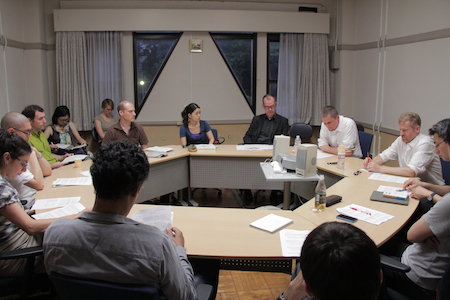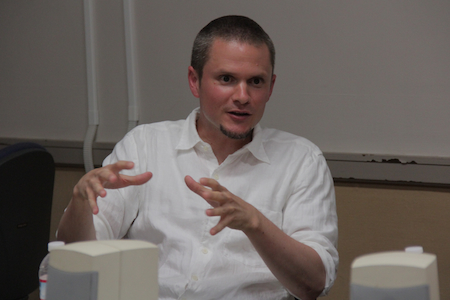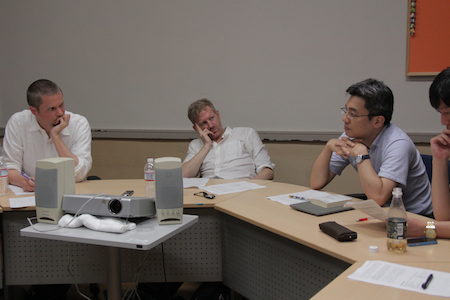[Report] Lecture by Prof. Max Ward "Philosophical Conversion and the Displacement of History"
On July 22nd, UTCP was pleased to host a presentation by Max Ward (Middlebury College) entitled "Philosophical Conversion and the Displacement of History: An Unorthodox Reading of Tanabe Hajime’s Zangedō to shite no tetsugaku".

In this presentation, Max Ward opens a two-fold line of inquiry. Taking Tanabe's own account of the genesis of Philosophy as Metanoetics as a point of departure, Ward first offers a novel analysis of the status of history in Tanabe's Metanoetics. In Tanabe's Preface, we find a striking account of the impasse of Japan in 1944-45, expressed in a narrative of personal torment as Tanabe confronts the powerlessness of philosophical discourse in a moment of national crisis. Crucially, Ward suggests, Tanabe folds the historical impasse into the philosophical, taking this as the occasion for a distinct form of critical reflection on the tradition. Here, Ward draws our attention to Tanabe's appeal to this historical crisis simultaneously as an ur-moment in the project of metanoetics, and as an "external reality" which is subsequently bracketed from the religio-philosophical inquiry that is metanoetics proper. On this account, the Metanoetics poses an intriguing paradox, insofar as it both appeals to a concrete historical crisis in Tanabe's personal narrative of lived history, and evacuates this concrete crisis from the temporal and historical logic of metanoetic critique.

As a means of understanding this paradoxical "displacement of history", Ward offers an original reading of Fredric Jameson's "political unconscious", drawing upon its critical hermeneutics of narrative form. Through a close reading of Tanabe's argument, Ward underscores the narrativizing effects of the Preface, and makes a compelling case for the use of Jameson's interpretive framework. As Jameson argues, a hermeneutics of literary texts should not reduce their political dimensions to a socio-historical context (i.e., the results of applying reflection theory), but rather try to understand them as "subtexts" which are in part produced through the narrative functors of the texts themselves. In this spirit, Ward interrogates the strategy by which Tanabe "interiorizes" and "textualizes" a lived historical crisis in the form of a subtext to the narrative and critical method of metanoetics.

Pressing further on this, Ward's second line of inquiry explores the ideologico-political significance of Tanabe's move to displace history. This is a broader examination of the reception of Tanabe's work that considers the deeper significance of metanoetics, via its interpretation in subsequent scholarly accounts of Tanabe's project. Here, Ward argues for a consideration of Tanabe in view of a more contemporary approach to the Kyoto School, informed by critical theory and Marxian hermeneutics. This approach is "unorthodox" in the sense that it does not attempt to bracket the political dimensions of the Kyoto School, framing it within "pure" questions of metaphysics, religion, or epistemology. Rather, the project of metanoetics only becomes fully legible as we open it to a larger questioning, taking into account the relationship between philosophy and politics. Following this approach, Ward argues that by considering Tanabe's inquiry in relation to questions of history — viz., how philosophical works are informed by their historical moments of production, and how these works offer trajectories of thought which lead us through or beyond these moments — we can grasp the broader philosophico-political significance of metanoetics.






